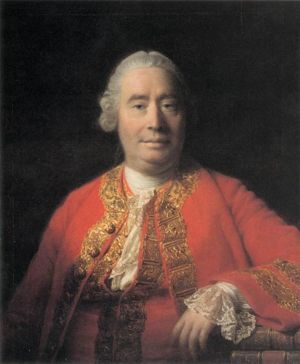Difference between revisions of "David Hume"
(cat.) |
Conservative (Talk | contribs) (Some? consiedered by some? I removed this) |
||
| Line 2: | Line 2: | ||
David Hume (1711-1776) was a Scottish philosopher and historian who promoted [[materialism]] and [[naturalism]] over [[spirituality]]. He was [[skeptical]] towards [[religion]], and his major philosophical works include ''A Treatise on Human Nature'', ''An Enquiry Concerning the Principles of Morals'', and ''Dialogues Concerning Natural Religion''. He also published the wide-ranging ''History of England'', which covered the history of [[Great Britain]] from the time of [[Julius Caesar]] to 1688. Many of his quotes have survived to this day, including "You can tell what is inside a person's soul by what comes out if it." | David Hume (1711-1776) was a Scottish philosopher and historian who promoted [[materialism]] and [[naturalism]] over [[spirituality]]. He was [[skeptical]] towards [[religion]], and his major philosophical works include ''A Treatise on Human Nature'', ''An Enquiry Concerning the Principles of Morals'', and ''Dialogues Concerning Natural Religion''. He also published the wide-ranging ''History of England'', which covered the history of [[Great Britain]] from the time of [[Julius Caesar]] to 1688. Many of his quotes have survived to this day, including "You can tell what is inside a person's soul by what comes out if it." | ||
| − | + | Hume has been criticized by many for his atheistic approach, and [[Charles Darwin]] declared Hume to have been his central influence, as did "Darwin's bulldog," [[Thomas Henry Huxley]]. {{citeneeded}} | |
Hume was one of the first philosophers to rigorously study [[ontological principles]]- vital tools of logical reasoning that are commonly used in maths, systemology, philosophy, and theology. He helped develop many of the common logical devices, most notably, [[Hume's Guillotine]] and [[Hume's Fork]] are named in honor of him. | Hume was one of the first philosophers to rigorously study [[ontological principles]]- vital tools of logical reasoning that are commonly used in maths, systemology, philosophy, and theology. He helped develop many of the common logical devices, most notably, [[Hume's Guillotine]] and [[Hume's Fork]] are named in honor of him. | ||
[[category:philosophers]] | [[category:philosophers]] | ||
[[Category:Scottish People]] | [[Category:Scottish People]] | ||
Revision as of 12:42, April 26, 2007
David Hume (1711-1776) was a Scottish philosopher and historian who promoted materialism and naturalism over spirituality. He was skeptical towards religion, and his major philosophical works include A Treatise on Human Nature, An Enquiry Concerning the Principles of Morals, and Dialogues Concerning Natural Religion. He also published the wide-ranging History of England, which covered the history of Great Britain from the time of Julius Caesar to 1688. Many of his quotes have survived to this day, including "You can tell what is inside a person's soul by what comes out if it."
Hume has been criticized by many for his atheistic approach, and Charles Darwin declared Hume to have been his central influence, as did "Darwin's bulldog," Thomas Henry Huxley. Template:Citeneeded
Hume was one of the first philosophers to rigorously study ontological principles- vital tools of logical reasoning that are commonly used in maths, systemology, philosophy, and theology. He helped develop many of the common logical devices, most notably, Hume's Guillotine and Hume's Fork are named in honor of him.
